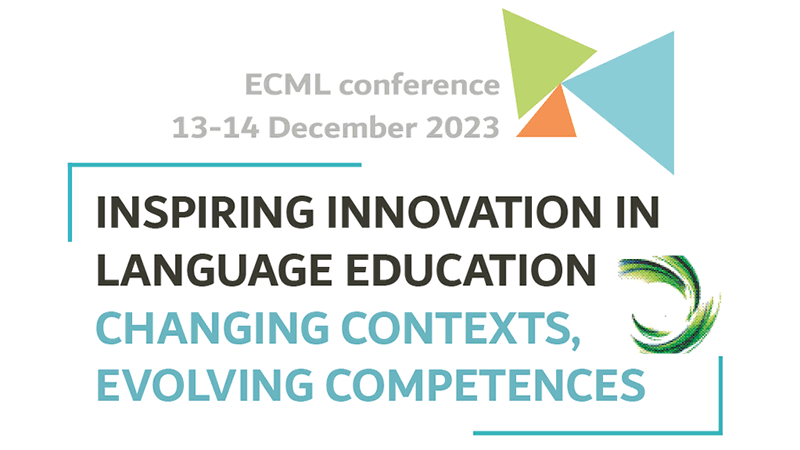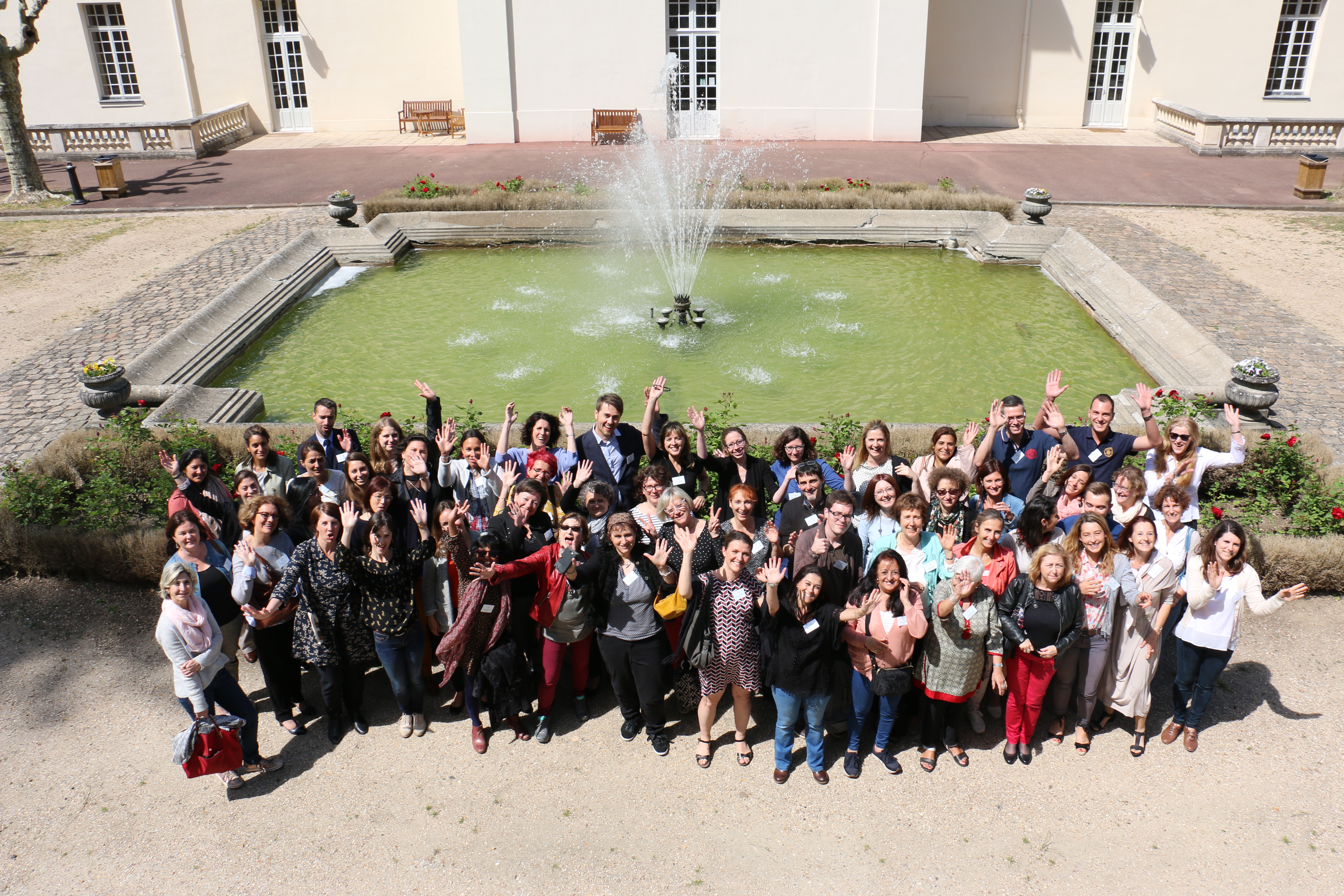Latest articles
11.12.2023
Final conference of the 6th medium-term programme 2020-2023 (13-14 December 2023, Graz, Austria & online)
“Inspiring innovation in language education: changing contexts, evolving competences” – Join the livestream!

The conference represents the culmination of the four years of work of the ECML’s “Inspiring innovation in language education: changing contexts, evolving competences” programme, involving, among others, 9projects, 1think tank, 12offers of training and consultancy (TaC) and a series of initiatives developed with the support of the European Commission.
The conference is aimed at all language education professionals and in particular at ECML stakeholders, policy makers and persons with a professional focus on the practice of language education (curriculum development, teacher education, material design…).
The programme involves plenary presentations, speeches, a round table, a series of smaller workshops for the presentation and discussion of programme outputs and outcomes as well as envisaged links to activities in the 2024-2027 programme.
The workshops on the second day of the conference will be organised thematically:
- Language teacher and learner competences,
- Transversal dimension of language education / Competences for life and work,
- Plurilingual and intercultural education,
- Languages of schooling; language in subjects.
Within each given theme there will be a focus on the completed project resources and related TaC activities from the current programme. Presenters will focus on the inspiring and innovative aspects of their TaC activity/new resources and will consider how the different approaches and materials presented in their thematic session complement one other.
This will also be an excellent opportunity to get a preview of the new ECML programme “Language education at the heart of democracy” (2024-2027).
In order to ensure access to a wider audience, the event will be streamed in both working languages (English and French) and the recordings made available on the ECML website.
Conference web page: English – French
Conference programme: English – French
Join the live streaming here – no registration required: English – French
#ECMLCELVconf2023
28.09.2018
ECML training and consultancy offers for 2019 - Quality assurance in language and citizenship courses": apply until 4 November 2018!
As more migrants and refugees from outside Europe arrive in member states, the provision of language courses and citizenship courses to support the integration in the host societies, and access to work, education and essential services becomes a burning priority.
Adult migrants | Quality assurance in language and citizenship courses
This offer is targeted at managers of institutions providing language and citizenship courses for migrants and/or directors of such courses, as well as policy and decision makers and provides:
- training courses and workshops that can be replicated flexibly after the life of the project
- materials and tools to support training, quality assurance and quality development in this field.
ECML experts with extensive experience of quality assurance and quality development in language education will provide supportive guidance and could enable stakeholders to take a fresh and more objective look at the quality and effectiveness of provisions. This team will work with national authorities and local experts to devise and implement in-country activities, tailored to the particular context and target audience.
*****
If you are looking for input for an in-service training to develop the professional skills of language educators or are in need of consultancy to advance local, regional or national reform processes and to meet international standards, take a closer look at what the ECML has on offer. Information on offers and the 2019 request form are available online http://www.ecml.at/TrainingandConsultancy
Requests for a training and consultancy activity must be submitted via the national ECML representative in the Governing Board. Educational professionals interested in organising a particular activity should therefore contact their national representative.
Deadline for submission of requests by the ECML Governing Board member: 4 November 2018.
17.09.2018
ECML training and consultancy offers for 2019 – Apply now!
Are you looking for input for an in-service training to develop the professional skills of language educators? Or are you in need of consultancy to advance local, regional or national reform processes and to meet international standards? Then take a closer look at what the ECML has on offer.
ECML experts in language education work with national authorities and local experts to devise and implement in-country activities, tailored to the particular context and target audience.
Information on offers and the 2019 request form are available online: http://www.ecml.at/TrainingandConsultancy
Requests for a training and consultancy activity must be submitted until 4 November 2018 via the national ECML representative in the Governing Board.
Educational professionals interested in organising a particular activity should therefore contact their national representative.
16.05.2018
Supporting multilingual classes: "Accompanying all language teachers in multilingual classes" (Sèvres, France, 17-18 May 2018)
In partnership with the European Centre for Modern Languages of the Council of Europe, the Ministry of Culture and the International Centre for Educational Studies (CIEP), the French Ministry of Education organised a training seminar for language teachers on 17 and 18 May 2018 in Sèvres, at the prestigious premises of CIEP, on the theme of supporting multilingual classes. The objective was to prepare teachers, teacher trainers, and administrators to develop the learners' plurilingual and intercultural repertoires in order to enhance their academic success and help ensure quality education for migrant learners.
The event was very successful, with 50 modern language teachers who participated, most of them acting as members of the French network "EOL - Learning environments where modern languages flourish", a project led by the ECML. The teachers were able to meet with the national coordinator, Jonas Erin, Inspector-General of National Education. They expressed their willingness to put into practice the contributions of training to make linguistic diversity a reality in their classes.
In addition, the seminar was opened at a high level by Pierre-François Mourier, Director of CIEP, Hervé Tilly, Deputy Director for European and Multilateral Affairs in charge of the interim Head of Service for European and International Relations and Cooperation, and Loïc Depecker, General Delegate for French Language and the Languages of France.

Author: © Communication Department of CIEP, translation: ECML
18.10.2017
Workshop “Adult Migrants – Quality Assurance in Language and Citizenship Courses” (21-22 September 2017)
Date: 21-22 September 2017
Venue: Institut national des langues (INL), 15 rue Léon Hengen, 1745 Luxembourg
Participants : 28 teachers and teacher trainers from the different language departments at INL; course organisers and teachers at ASTI Asbl (Association de Soutien aux Travailleurs Immigrés)
Participation in the Adult Migrants – Quality Assurance in Language and Citizenship Courses workshop is especially worthwhile for course organisers and teachers who work in a school environment that caters to a large immigrant population. Referring to the criteria in the Self-Assessment Handbook for Providers of Courses for Adult Migrants, the moderators encourage the participants to consider how well courses are designed for this particular student population and to what extent the learning objectives are derived from a needs assessment of this specific student group.
Another focus of the workshop is on lesson planning and the selection of appropriate materials and activities to achieve the course objectives while constantly keeping in mind the students’ specific needs. The importance of choosing suitable teaching methods and techniques to facilitate the acquisition of the target language with a culturally and educationally diverse group of learners is also highlighted.
Adequate time is allowed for discussion of key issues and case studies, the exchange of practice and (classroom) experiences. One of the main strengths of the workshop is the provision of numerous opportunities to share knowledge and information. Deliberate reflection on the various aspects of teaching and learning is encouraged and plays a key role. This approach should allow the development of teacher competencies, more varied practices and ultimately improved courses.
Christiane Klein (local organiser), Institut national des langues, Luxembourg
20.06.2017
Europe and migration to take centre-stage at the of the Council of Europe Parliamentary Assembly (PACE) Summer plenary session (Strasbourg, France, 26-30 June 2017)
Four reports will be debated on Wednesday 28 June, focusing on the humanitarian and political response to the migration crisis, the human rights implications of the European response to transit migration, migration as an opportunity for European development and the integration of refugees in times of critical pressure, in particular:
The reports provide an overview of different national approaches to the integration of migrants in Council of Europe member States. They put emphasis on good practices which can be broadly used to succeed in engaging refugees in the daily economic, social and cultural life of host communities. They recommend, among others, that member States should:
- provide adult migrants with the necessary language and vocational training courses as well as a level of civic instruction which provides orientations for everyday life in the country;
- provide children with immediate access to appropriate education or day care, where possible including them in mainstream educational structures, provided allowances are made to minimise language and cultural barriers;
- promote inclusive societies by enabling the full and active participation of migrants in all aspects of life (for example, through the provision of opportunities for language learning for migrants, language and citizenship classes for asylum seekers and refugees, and the development of educational programmes in schools to promote knowledge of different cultures, languages and religions).
Related links